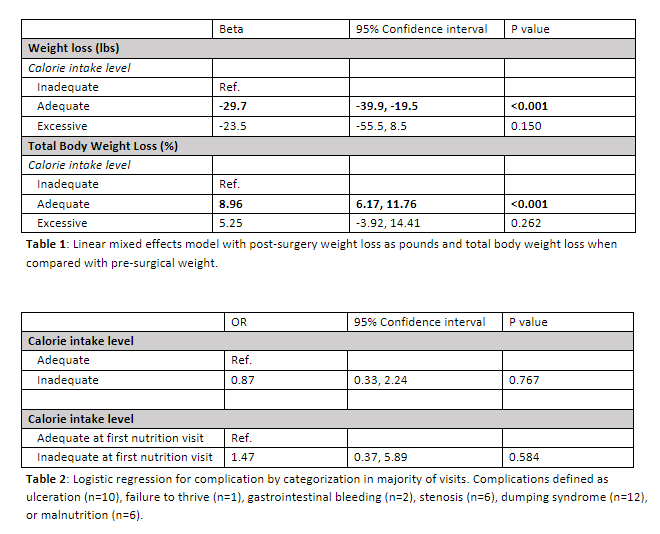Introduction:
Bariatric surgery is one of the most effective and enduring treatments for obesity. The nutrition guidelines for the pre- and post-operative bariatric patient include parameters for diet progression; however, the literature is very limited and there is no evidence-based consensus on recommended energy intake following bariatric surgery. The degree of caloric restriction required to provide optimal outcomes after sleeve gastrectomy (SG) and Roux-en-Y gastric bypass (RYGB) was investigated.
Methods:
We performed a retrospective cohort analysis of patients who underwent bariatric surgery (SG or RYGB) with at least three post-operative nutrition visits between January 1st, 2002 and December 31st, 2022. Data including demographics, surgical history, complications, and post-operative nutrition patterns were gathered from each visit. Patients were stratified into three groups categorized by inadequate, adequate, or excessive caloric intake as determined by a registered bariatric dietician. Individualized parameters specific to patientsí post-operative dietary progression and changing metabolic rate at the time of each visit were taken into consideration. A linear mixed effects model was used to assess the effect of different levels of calorie consumption on total body weight loss (TBWL). Logistic regression analysis was performed and stratified by caloric intake group.
Results:
A total of 96 patients were included for analysis. A majority of patients were female (91.7%). 27 patients (28.1%) underwent SG, 64 (66.7%) underwent RYGB, and 5 (5.2%) had conversion of SG to RYGB. The mean pre-surgical BMI was 45.2 kg/m2. Linear mixed effects modeling revealed that adequate caloric intake results in 30 pounds (9% TBWL) greater weight loss compared to inadequate caloric intake following bariatric surgery (Table 1, p<0.001). There was no significant difference in weight loss between those with inadequate versus excessive caloric intake. There was no significant difference in complication rates (marginal ulcer, stenosis, fistula, malnutrition, among others) in patients with adequate and inadequate caloric intake (Table 2).
Conclusions:
Adequate caloric intake correlates with significantly greater weight loss following bariatric surgery compared to inadequate caloric intake. Our study highlights that restricting calories does not result in better outcomes, but rather adequate caloric intake leads to more weight loss and improved outcomes following bariatric surgery.
